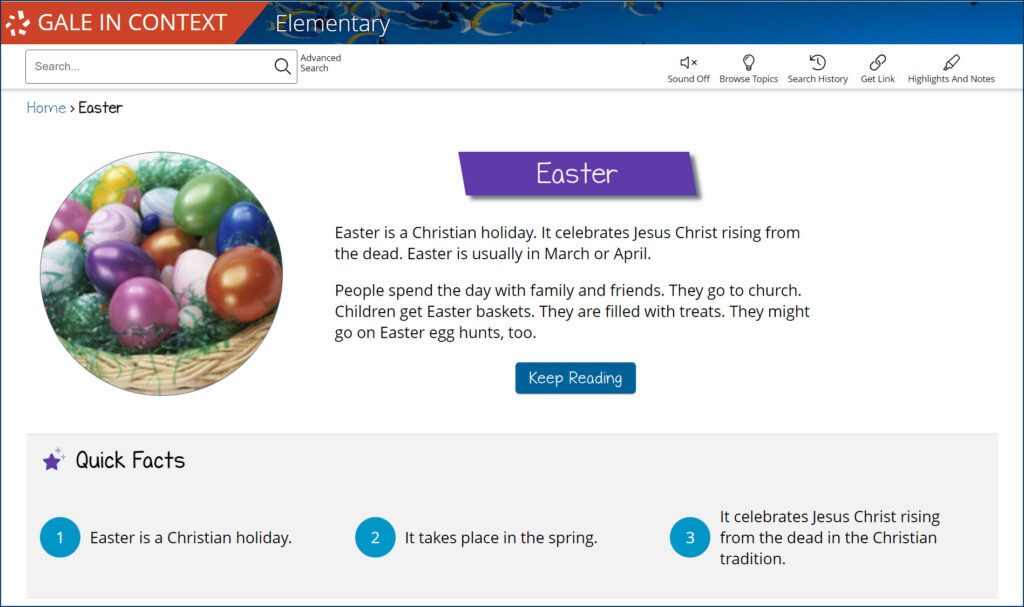| By Gale Staff |
Celebrating holidays in your elementary classroom is always exciting—and the topic can be especially engaging from a global perspective. Learning how different cultures approach the same holiday is fascinating and encourages students to identify connections between themselves and those from other backgrounds, encouraging empathy and nurturing curiosity. As the spring semester blooms, elementary school teachers can prepare Easter-themed lesson plans that explore the holiday’s traditions around the world. Gale In Context: Elementary features a special collection of global celebrations, including across the United States, North and South America, Europe, and Africa. You can rely on Gale In Context: Elementary to learn about different customs, unique dishes, and beliefs, all through our highly accessible format curated for young learners.
Before diving in, leverage the teacher-focused resources in Gale In Context: For Educators. This premier database houses ready-made lesson plans and classroom activities, all crafted with state curricular guidance at the fore. You can even tap into our built-in teacher collaboration tools to share ideas with your colleagues. The productivity and professional development strategies housed in For Educators can save time in your already busy schedule.
While you and your students travel the world through the collection’s books, magazine articles, and other themed resources, help students identify ways that their own family’s holiday traditions compare with those from other countries. Here are some ideas to help start the conversation.
Discuss Easter in the U.S.
Begin your special holiday lesson with Gale In Context: Elementary’s Easter portal. You can kick things off with our Easter summary page, which outlines the holiday’s basic structure and vocabulary. Students can even switch between two reading-level options to make the information more accessible to their individual learning needs.

For many Americans, Easter is a more formal, family-oriented holiday. Millions attend church services on Easter morning (wearing their springtime best) and likely share a meal consisting of lamb, ham, and other rich foods. Across the U.S., Easter is a colorful, candy-filled celebration that features neighborhood Easter egg hunts, pastel decorations—and even a skydiving Easter bunny. Some communities, especially in the South, host Easter performances, such as pageants or plays featuring singing, dancing, and even biblical reenactments.
Discussion Idea: While most people in the U.S. observe Easter in some capacity, certain families follow a more traditional celebration, whereas others choose to observe less religiously. Encourage students to discuss if and how they celebrate Easter at home. For those who do not observe Easter, is there another holiday during the springtime that their family shares instead?
Explore Easter in Europe
Easter is just as popular throughout Europe and shares many customs and celebrations with the United States. In Vatican City, the Pope delivers a special Easter message, and thousands of people from around the world attend. In Sweden, children decorate and eat hard-boiled eggs, though Swedish families also dine on herring and salmon. In France, in place of the Easter Bunny, a flying bell delivers candy and colored eggs to children on Easter morning. In Italy, people attend large street processions worshipping holy figures like the Madonna or Jesus Christ. In the Czech Republic, young boys shake wooden rattles throughout the town, a tradition meant to scare away the apostle Judas. As a class, you can find these interesting traditions and so much more through your Easter explorations in Gale In Context: Elementary.
Activity Idea: Make Italian Easter bread! Gale In Context: Elementary’s book article on Italy includes an easy-to-follow recipe you can make with your class.
Discover Easter Traditions Across the Americas
Christianity is the dominant religion throughout the Americas. As such, people across both continents observe Easter, with some countries hosting elaborate celebrations. For example, Easter is one of Guatemala’s largest celebrations; Guatemalan families observe a special Holy Week leading up to Easter Sunday, during which they dress in costumes, attend parades, and eat indulgent candied fruits. Salvadorans enjoy delectable torrejas, a sort of Latin American spin on French toast. In Haiti, children make bright kites to fly through the streets. And in rural Chile, priests spend Easter Sunday traveling in the street accompanied by Chilean cowboys in a festival known as Fiesta de Cuasimodo. These exciting and colorful customs certainly rival that of the skydiving Easter bunny.
Discussion Idea: As students learn about these new and different ways to celebrate, ask them to share which country they would most like to visit during their Easter holiday and why.
Learn About Easter in Africa
Africa is home to more than 600 million Christians, and as in other parts of the world, they observe Easter in both religious and social ways. In many African countries, like Zambia and Botswana, the Monday after Easter is a public holiday. This makes the Easter holiday a special long weekend for large family gatherings and Easter feasts, which often include rice, lamb, and spiced veggies. African Christians attend church throughout the entire weekend as well. It’s a time for generosity, kindness, and spiritual reflection; during Easter weekend, some African communities give Easter eggs and small gifts to those in need rather than between family members.
Activity Idea: There’s nothing more fun than dyeing Easter eggs! As a class, set students up with hard-boiled eggs and plenty of colorful dyes. As in the African tradition, these eggs are not for keeping. Encourage students to dye eggs for family members, friends, and their classmates while expressing words of kindness.
This spring, integrate Gale In Context: Elementary into your lesson planning and elevate your students’ learning. And, with Gale In Context: For Educators, your daily responsibilities can be more organized and a little easier—meaning you can spend more celebrating with family or just enjoying your weekend.
Not a Gale In Context: Elementary subscriber? To learn more and get started, contact your local Gale representative.

